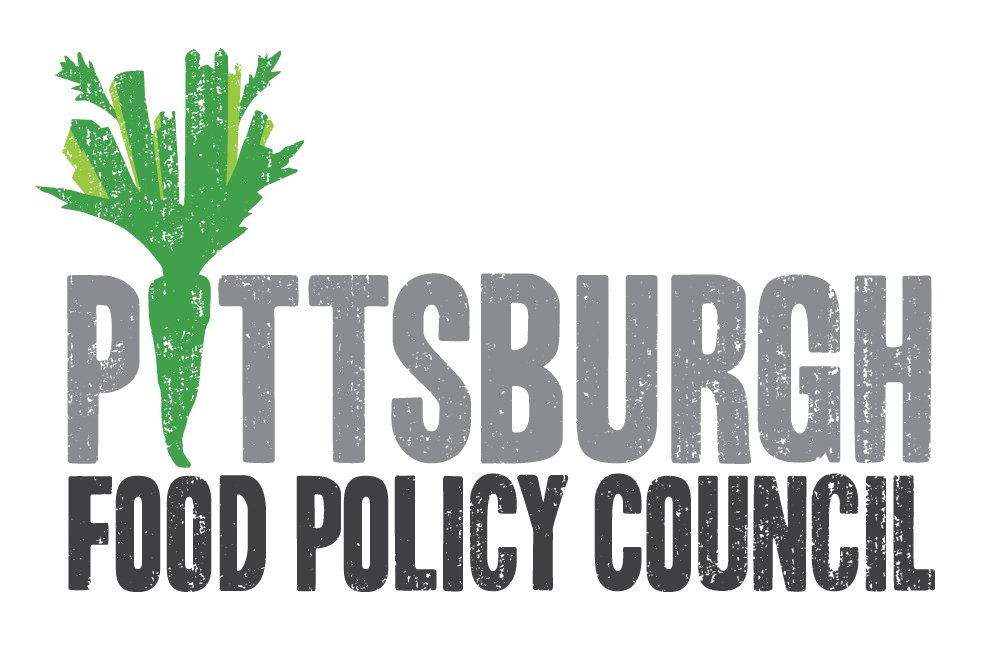Gainey Transition Report Review
In winter 2022, PFPC mobilized its member network to engage in the community engagement process led by Mayor Ed Gainey’s Transition Team. On Thursday May 12th, the Gainey Transition Team presented their recommendations report to the Mayor. Upon review, we have identified several recommendations relevant to this mission of the Pittsburgh Food Policy Council and the priorities laid out in the Greater Pittsburgh Food Action Plan.
Equitable Development
- Recommendation 14 - Identify and remove barriers to small business development for Black and Latinx entrepreneurs (page 36)
- Discussion of City procurement policies
- Recommendation 15 - Improve access to commercial properties for locally owned small and minority businesses (page 37)
Education and Workforce Development
Recommendation 1 - Create an Office of Education Opportunity (Page 42) Improve the relationship of PPS and the City of Pittsburgh, increased coordination with other stakeholders to improve programming, etc.
Recommendation 2 - The City of Pittsburgh will collaborate with PPS-Career and Technical Education Division (PPS-CTE) to create paid internships that lead to entry level career-ladder jobs for 5% of its eligible students within the next two (2) years. (Page 45)
- Culinary Arts is one of the CTE program areas.
Community Health and Safety
- Recommendation 14 - Allocate funds to develop and create public health and food justice initiatives (Page 84)
- “A comprehensive look at the history of food security/insecurity, an analysis of data driven research on the topic and those efforts employed in like-communities across America, should provide the necessary insight to address the nutrition deficit.” *
- Recommendation 18 - Strengthen/continue collaboration with Allegheny County Health Department (ACHD) and Pennsylvania Health Department to foster greater access to resources and social supports for residents, such as in-home services for older adults, food access, and safe, lead- and asbestos-free housing for all. The CHSC specifically recommends the continued collaboration with ACHD and the REACH Program (Page 88)
Infrastructure and Environment
Recommendation 3 - Maintain ecological health (Page 94)
- “The administration should partner with the ACCD in the completion of an urban soil survey for Pittsburgh and mandate soil health corrective actions as part of demolition permitting. Establish an equitable, denser, distributed network of compost drop off/processing facilities, with composting being considered for more than yard waste, as commercial composting of household waste would also be valuable.”
Recommendation 7 - Support and expand the healthy food infrastructure (Page 97)
- “Assess areas of the city for food scarcity and need. Inventory the services that may already be available. Support funding of projects that promote commercial access to food sources, including URA funding for corner stores, co-op grocery stores, or commercial markets that are committed to healthy food inventories. Partner with nonprofits and community groups to establish community gardens, farmers' markets, and food distribution sites on public land and in public facilities.
- “The City plays an important role in ensuring that all Pittsburghers have access to healthy foods. While many needs can be addressed with supermarkets, stores, and restaurants, the City can augment access with community garden programs, farmers markets, and community centers that distribute food to those in need. In addition, the houseless population has grown in recent years and food access is an important part to helping them with health and stability. The City can help ensure that all neighborhoods have access to healthy food sources, including commercial sources, nonprofit sources, and self-sufficiency through gardens.” *
- Recommendation 11 - Forge a stronger collaborative relationship with the Port Authority for improved public transit (Page 103)
- “Pilot a free bus pass program that provides free bus passes to city employees and residents in certain communities (or Supplemental Nutrition Assistance Program (SNAP) recipients).”
The mission of the Pittsburgh Food Policy Council (PFPC) is to build a food system that benefits our communities, economy, and environment in ways that are just, equitable and sustainable. Driven by community-led solutions, we re-imagine our region’s food system and seek policies that promote local food growing, sustainable agriculture, equitable development, and access to healthy food, particularly in low-income communities.
